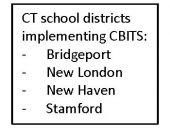February 19, 2016


The links between trauma exposure, behavioral health, and academic functioning highlight the importance of improving schools’ capacity to understand, identify, and respond to children suffering from exposure to trauma. Schools are increasingly called upon to address children’s behavioral health needs, however many have limited training and resources. Supporting schools to answer this call with more effective behavioral health services, including trauma-informed, evidence-based interventions, helps produce healthier children and stronger schools and communities.
Research also shows a strong relationship between trauma and impaired school functioning. Youth who experience trauma are more likely to have lower reading achievement, grade point average, and high school graduation rates, as well as more absences and higher rates of expulsion and suspension. It is important to ensure that youth suffering from trauma exposure are identified as early as possible and have access to trauma-focused services in normative settings such as schools.
Two important components of creating a trauma-informed school include screening and delivery of trauma-focused interventions. In 2015, several schools in Connecticut began screening children for trauma while offering the Cognitive Behavioral Intervention for  Trauma in Schools (CBITS) as a new service.
Trauma in Schools (CBITS) as a new service.
CBITS is a 10-session evidence-based, group intervention delivered in schools for children in grades 5-12 who have experienced trauma. CBITS emphasizes cognitive-behavioral techniques such as social problem solving, relaxation, psychoeducation, cognitive restructuring, and exposure. The model was developed by a team of clinician-researchers from the RAND Corporation, the University of California at Los Angeles (UCLA), and the Los Angeles Unified School District (LAUSD).
Research shows CBITS reduces PTSD symptoms, depression, and behavior problems and improves grades, attendance, coping skills, and peer and parent support.
The Department of Children and Families (DCF) has funded dissemination of CBITS to 17 schools in four communities in partnership with the CBITS model developers, the Child Health and Development Institute of Connecticut (CHDI), local school districts, school-based health centers, and provider agencies. To date:
Of the 530 children screened, 42% (223) reported significant levels of traumatic stress reactions, a finding that underscores the need for trauma-informed services. Not all of the children who screened positive received CBITS; some families declined treatment, some children received treatment outside the school, and others were more appropriate for individual treatment rather than group-based treatment like CBITS.
Initial results from the first 52 children completing CBITS show statistically significant reductions in PTSD symptoms and general behavior problems, as well as improvements in functioning.
DCF plans to expand CBITS to up to six additional communities in Connecticut through a competitive request for proposals that will be issued in Spring 2016. Additionally, currently participating districts will be trained to offer “Bounce Back,” a CBITS adaptation designed for children in Kindergarten through 5th grade. It is anticipated that more than 300 children will receive CBITS or Bounce Back this year and that capacity will continue to increase over time. Connecticut’s efforts to support schools to build capacity to understand, identify, and address trauma exposure will result in better outcomes for students, schools, and communities.
For more information on the CBITS model visit https://cbitsprogram.org/. For more information on CBITS or trauma-informed care in Connecticut visit www.chdi.org or contact Heather Sapere at sapere@uchc.edu or Jason Lang at jalang@uchc.edu. Related publications include CHDI’s IMPACTs “Advancing Trauma-Informed Systems for Children” and “Improving Outcomes for Children in Schools.”